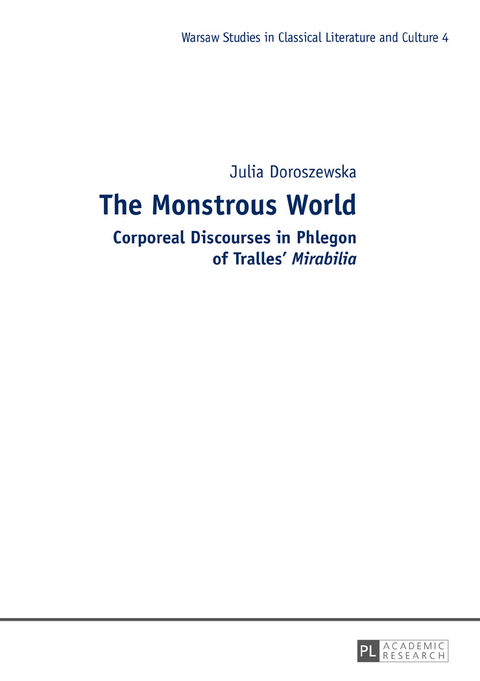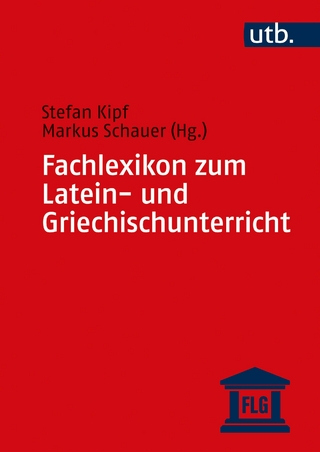
The Monstrous World
Corporeal Discourses in Phlegon of Tralles’ «Mirabilia»
Seiten
2016
Peter Lang Gmbh, Internationaler Verlag Der Wissenschaften
978-3-631-65626-6 (ISBN)
Peter Lang Gmbh, Internationaler Verlag Der Wissenschaften
978-3-631-65626-6 (ISBN)
lt;p>The cultural category of monster is the key to understanding the "Mirabilia" by Phlegon of Tralles. Applied to Phlegon's 35 marvelous stories, this category allows all his reported cases to be defined as either hybrid creatures, or as beings monstrous in terms of scale, size or multiplicity. In each case corporeality receives the greatest emphasis.
lt;p>Revenants, oracular heads, hermaphrodites, sex-changers, human-animal children, multiple pregnancies, births, body features ... This is just a sample of subjects that Phlegon of Tralles explored in the 2nd century AD in his "Mirabilia". This study identifies the common motifs of Phlegon's text and determines his criterion of selection: using the cultural category of "monster", it argues that Phlegon exclusively collected stories of either hybrid creatures or human "record-breakers" with respect to scale, size and multiplicity of their corporeal features. In this light, the "Mirabilia" appear to be a book on monsters and the monstrous that corresponds with a general fondness for marvels and oddities during the Roman imperial period.
lt;p>Revenants, oracular heads, hermaphrodites, sex-changers, human-animal children, multiple pregnancies, births, body features ... This is just a sample of subjects that Phlegon of Tralles explored in the 2nd century AD in his "Mirabilia". This study identifies the common motifs of Phlegon's text and determines his criterion of selection: using the cultural category of "monster", it argues that Phlegon exclusively collected stories of either hybrid creatures or human "record-breakers" with respect to scale, size and multiplicity of their corporeal features. In this light, the "Mirabilia" appear to be a book on monsters and the monstrous that corresponds with a general fondness for marvels and oddities during the Roman imperial period.
Julia Doroszewska is Assistant Professor of Classical Philology at the University of Silesia, Poland. Her field of interest is the literature of the Roman Empire and more particularly the writings of Phlegon of Tralles.
lt;p>Monsters - Monstrosity - Neither Dead nor Alive - Neither Woman nor Man - Neither Human nor Animal - Revenants or Walking Corpses - Hermaphrodites: The God vs. The Monsters - Sex-changers - Freaks of Nature - Paradoxography - Deformed Slaves - The Emperor as a Patron of Monsters - Grotesque and bizarre - Corporeality - Deformation - Teratology
| Erscheinungsdatum | 27.08.2016 |
|---|---|
| Reihe/Serie | Studies in Classical Literature and Culture ; 4 |
| Mitarbeit |
Herausgeber (Serie): Mariusz Zagorski |
| Verlagsort | Frankfurt a.M. |
| Sprache | englisch |
| Maße | 148 x 210 mm |
| Gewicht | 350 g |
| Themenwelt | Geisteswissenschaften ► Geschichte |
| Geisteswissenschaften ► Sprach- / Literaturwissenschaft ► Latein / Altgriechisch | |
| Geisteswissenschaften ► Sprach- / Literaturwissenschaft ► Literaturwissenschaft | |
| Geisteswissenschaften ► Sprach- / Literaturwissenschaft ► Sprachwissenschaft | |
| Sozialwissenschaften | |
| Schlagworte | Ancient Greek Literature • Ancient Imperial Literature • Corporeal • discourses • Doroszewska • Ghosts • Julia • Mariusz • «Mirabilia» • Mirabilia • monsters • monstrous • Paradoxography • Phlegon • Sex-changers • tralles • Tralles' • Tralles’ • World • Zagorski |
| ISBN-10 | 3-631-65626-2 / 3631656262 |
| ISBN-13 | 978-3-631-65626-6 / 9783631656266 |
| Zustand | Neuware |
| Haben Sie eine Frage zum Produkt? |
Mehr entdecken
aus dem Bereich
aus dem Bereich
kleines Lexikon deutscher Wörter lateinischer Herkunft
Buch | Softcover (2023)
C.H.Beck (Verlag)
CHF 20,95
Per Aspera ad Astra. Intensivkurs für Studierende zur Vorbereitung …
Buch | Softcover (2023)
Universitätsverlag Winter GmbH Heidelberg
CHF 32,15


